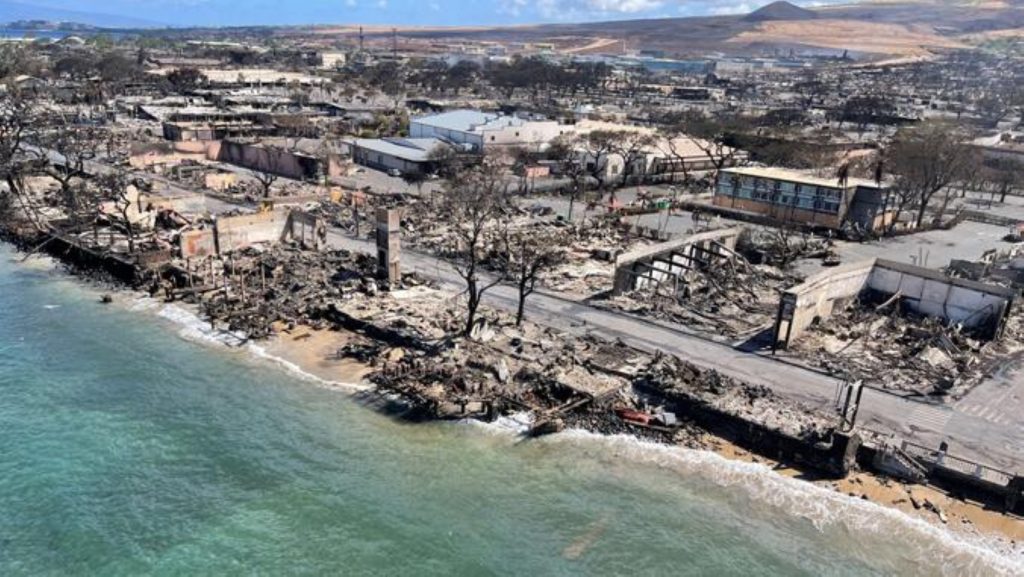New study led by UH researchers reveals link between spike in suicides, overdose deaths and 2023 Lahaina wildfire
The Aug. 8, 2023, Lahaina wildfire nearly burned the historic West Maui community off the map. It’s ferocity — fueled by strong winds and extremely dry conditions — was frightening, and worse yet, deadly. One of the deadliest wildfires in U.S. history, it killed more than 100 people.
It’s been 2 years since the wildfire’s flames rapidly spread through Lahaina Town, consuming businesses, homes and schools, among other structures, as well as people’s futures; however, a new study led by University of Hawaiʻi researchers reveals that its death toll reached far beyond just those directly burned in the blaze.

Published on Aug. 6 in the Journal of the American Medical Association, the new research reveals deaths by suicide and drug overdose significantly increased statewide in the aftermath of the August 2023 Lahaina wildfire.
Suicide and overdose death rates increased 46% statewide in August 2023 compared with previous months. The impact was much greater on Maui, where there was a 97% spike in suicide and overdose deaths .
When limiting their analysis to just suicides in August 2023, researchers found the suicide rate was 182% higher on Maui than other islands in the state.
It is one of the first studies to show wildfires can lead to immediate suicides and overdose deaths.
The new study is also a call to action, emphasizing the importance of early behavioral health intervention during disaster responses and recommending suicide and overdose prevention be part of all future wildfire response and recovery plans.
Alex Ortega, dean of the Thompson School of Social Work and Public Health, and Keawe‘aimoku Kaholokula, chairman of the Department of Native Hawaiian Health in the John A. Burns School of Medicine, led the research.
Both schools are part of the University of Hawaiʻi at Mānoa.
Jonathan Purtle, associate professor at New York University’s School of Global Public Health, also was a lead on the research.
“Nationally and globally, we have seen an increase in devastating wildfires, and these fires can have a tremendous impact on the health and well-being of communities,” Ortega said in a University of Hawaiʻi release highlighting the study’s results. “Public health must be adequately prepared to respond to serious mental health consequences of wildfires and other climate-related disasters that are increasing in both frequency and severity.”
The release came a day before the 2-year anniversary of the Lahaina wildfire.
Researchers analyzed death records from all of Hawai‘i’s counties from 2014 through 2023, comparing death rates before, during and after the wildfire.
“Prior research has found similar effects in the months after wildfires and other disasters,” Purtle said in the release. “But the immediacy of the effects on suicide rates that we observed [on] Maui are unique and troubling.”
Researchers suggest direct exposure to the wildfires and indirect effects — such as concern for loved ones — might have contributed to the significant spike in death rates.
Their findings also show that residents who fled Maui for other islands could have contributed to the increase in statewide suicide and overdose deaths.

In an earlier study also led by the University of Hawaiʻi researchers, the team documented a 41% spike in 988 Lifeline calls after the Lahaina wildfire, exposing critical gaps in Hawaiʻi’s mental health infrastructure.
“Plans should also focus on the psychological and emotional impacts communities face — including hopelessness, cultural disconnection and stigma,” he said about wildfire response and recovery plans in the release. “There needs to be a plan for suicide and substance abuse prevention, and other mental health support.”
The research used the most recent death data available from U.S. Centers for Disease Control and Prevention. Because of data use agreements and to protect confidentiality of individuals who died, study authors are not allowed to report numbers smaller than 10.
Researchers will use 2024 data when it becomes available to see if there was an increase in suicides and/or overdoses throughout the course of last year, as more time elapsed since the wildfires.
This study is part of the National Institutes of Health-funded Maui Learnings to Overcome Adversities project, a 5-year effort led by University of Hawaiʻi researchers to understand how disasters such as the Lahaina wildfire affect community, health care and emergency response system resiliency.
Research focuses on vulnerable populations and aims to strengthen health system resilience and improve access to care.



